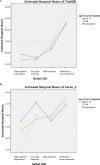Burden among Family Caregivers of Dementia in the Oldest-Old: An Exploratory Study
- PMID: 29204426
- PMCID: PMC5698684
- DOI: 10.3389/fmed.2017.00205
Burden among Family Caregivers of Dementia in the Oldest-Old: An Exploratory Study
Abstract
Background: With >85 years, the fastest growing age segment in developed countries, dementia in the oldest-old is projected to increase exponentially. Being older, caregivers of dementia in oldest-old (CDOO) may experience unique challenges compared with younger-age groups. Thus, we aim to explore demographic characteristics and burden pattern among CDOO.
Methods: We studied 458 family caregiver-patient dyads attending an outpatient memory clinic. We classified patients into three age-groups: <75, 75-84, and ≥85 years. We measured caregiver burden using the Zarit Burden Interview (ZBI) 4-factor structure described by Cheah et al. (1). We compared care recipient characteristics, caregiver demographics, and ZBI total/factors scores between the three age-groups, and performed 2-way analysis of variance (ANOVA) to ascertain the effect of age-group by disease severity interaction.
Results: Oldest-old care recipients were more impaired in cognitive function and instrumental ADL; there was no difference in behavior and basic ADL. Compared with the other two age-groups, CDOO were older (mean age: 50.4 vs 55.5 vs 56.8 years, P < 0.01), and overwhelmingly adult children (85.9%) as opposed to spouses (5.3%). CDOO also had higher ZBI total score, role strain, and personal strain (all P < 0.05). However, there was no difference in worry about performance scores. 2-way ANOVA did not reveal significant age-group by disease severity interaction for ZBI total and factor scores, although distinctive differences were seen between role/personal strain with worry about performance in mild cognitive impairment and very mild dementia.
Conclusion: Our study highlighted that CDOO were mainly older adult children who experienced significant role and personal strain independent of disease severity while caring for their family member with more impaired cognitive and physical function. These results pave the way for targeted interventions to address the unique burden faced by this rapidly growing group of caregivers.
Keywords: Zarit Burden Interview; caregiver burden; dementia; dimensions; oldest-old.
Figures
Similar articles
-
Predictors of caregiver burden in aged caregivers of demented older patients.BMC Geriatr. 2021 Jan 14;21(1):59. doi: 10.1186/s12877-021-02007-1. BMC Geriatr. 2021. PMID: 33446114 Free PMC article.
-
[Caregiver burden in dementia: evaluation with a Japanese version of the Zarit caregiver burden interview].No To Shinkei. 1998 Jun;50(6):561-7. No To Shinkei. 1998. PMID: 9656252 Japanese.
-
A validation of the Croatian version of Zarit Burden Interview and clinical predictors of caregiver burden in informal caregivers of patients with dementia: a cross-sectional study.Croat Med J. 2020 Dec 31;61(6):527-537. doi: 10.3325/cmj.2020.61.527. Croat Med J. 2020. PMID: 33410300 Free PMC article.
-
Trajectories of Multidimensional Caregiver Burden in Chinese Informal Caregivers for Dementia: Evidence from Exploratory and Confirmatory Factor Analysis of the Zarit Burden Interview.J Alzheimers Dis. 2017;59(4):1317-1325. doi: 10.3233/JAD-170172. J Alzheimers Dis. 2017. PMID: 28759966
-
Diagnosis and Management of Cognitive Concerns in the Oldest-Old.Curr Treat Options Neurol. 2021;23(3):10. doi: 10.1007/s11940-021-00665-5. Epub 2021 Mar 26. Curr Treat Options Neurol. 2021. PMID: 33786000 Free PMC article. Review.
Cited by
-
Understanding the lived experiences of family caregivers of individuals with dementia in Soweto, a South African Township.Dementia (London). 2022 Oct;21(7):2264-2287. doi: 10.1177/14713012221118441. Epub 2022 Aug 13. Dementia (London). 2022. PMID: 35968611 Free PMC article.
-
Neuropsychiatric symptoms associated with family caregiver burden and depression.Dement Neuropsychol. 2021 Jan-Mar;15(1):128-135. doi: 10.1590/1980-57642021dn15-010014. Dement Neuropsychol. 2021. PMID: 33907606 Free PMC article.
-
Caring for people with dementia in rural Uganda: qualitative study of caregiving burden experienced by informal and formal caregivers.J Glob Health Rep. 2020;4:e2020038. doi: 10.29392/001c.12848. Epub 2020 Jun 16. J Glob Health Rep. 2020. PMID: 33043153 Free PMC article.
-
Clinical Psychological Figures in Healthcare Professionals: Resilience and Maladjustment as the "Cost of Care".Front Psychol. 2020 Dec 1;11:607783. doi: 10.3389/fpsyg.2020.607783. eCollection 2020. Front Psychol. 2020. PMID: 33335503 Free PMC article.
-
Caring for Dementia Caregivers: Psychosocial Factors Related to Engagement in Self-Care Activities.Behav Sci (Basel). 2023 Oct 18;13(10):851. doi: 10.3390/bs13100851. Behav Sci (Basel). 2023. PMID: 37887501 Free PMC article.
References
-
- Dobriansky PT, Suzman RM, Hodes RJ. Why Population Aging Matters: A Global Perspective. Washington, DC: National Institute on Ageing, National Institutes of Health, US Department of Health and Human Service, US Department of State (Publication no.07–6134) (2007).
-
- State of Elderly in Singapore; 2008/2009 Report. Available from: https://www.duke-nus.edu.sg/care/wp-content/uploads/State-of-the-Elderly...
LinkOut - more resources
Full Text Sources
Other Literature Sources


